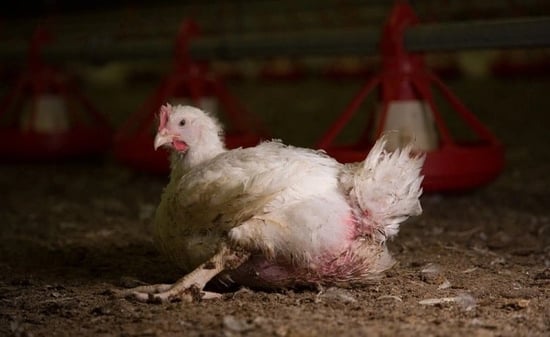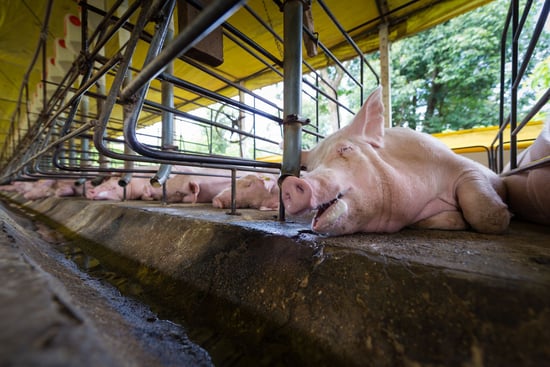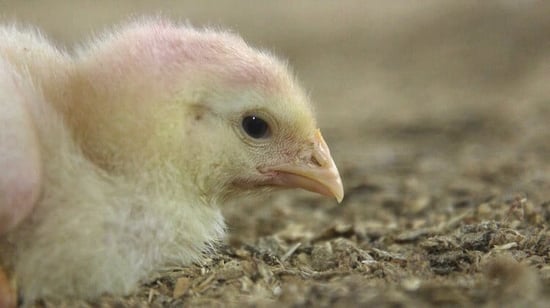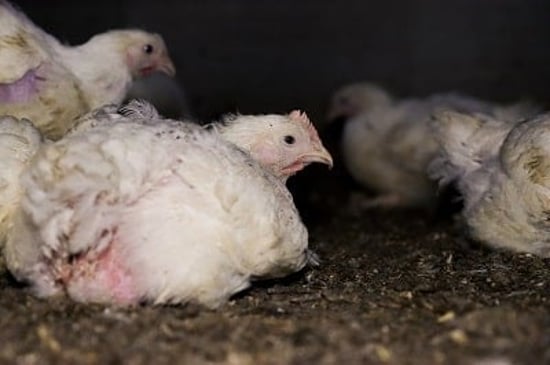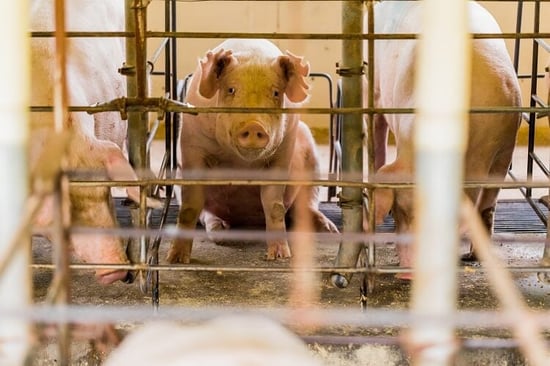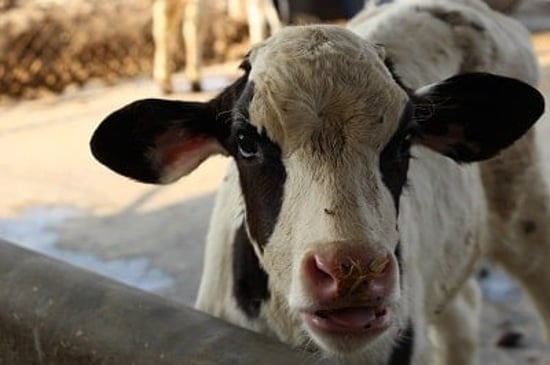
Animal cruelty in farming
Banner image credit: Farm Transparency Project
From painful mutilations, early weaning and poor air quality to unnatural feeding regimes, rough handling, long-distance transport and ultimately slaughter at a young age – animals on factory farms suffer on many levels.
Within the harsh confinements of factory farms, animals are painfully mutilated and kept in cramped, barren cages, pens, and sheds. It is impossible for them to fulfil their hardwired instincts to forage or perch, build nests, and interact with one another in comfort. This, in turn, causes them severe stress, injuries, ailments, hunger, and social deprivation.
The demand for cheap meat is equating to more animals being churned through factory farms like cogs in a machine. It is inhumane to treat animals like pigs, chickens, cows and many others like commodities when they are living beings who feel complex emotions such as pain, joy, and fear – just like us.
We need to break the cycle of suffering in our global food system as it is not healthy for anyone – the consumers, the workers, the animals, or the planet we call home.
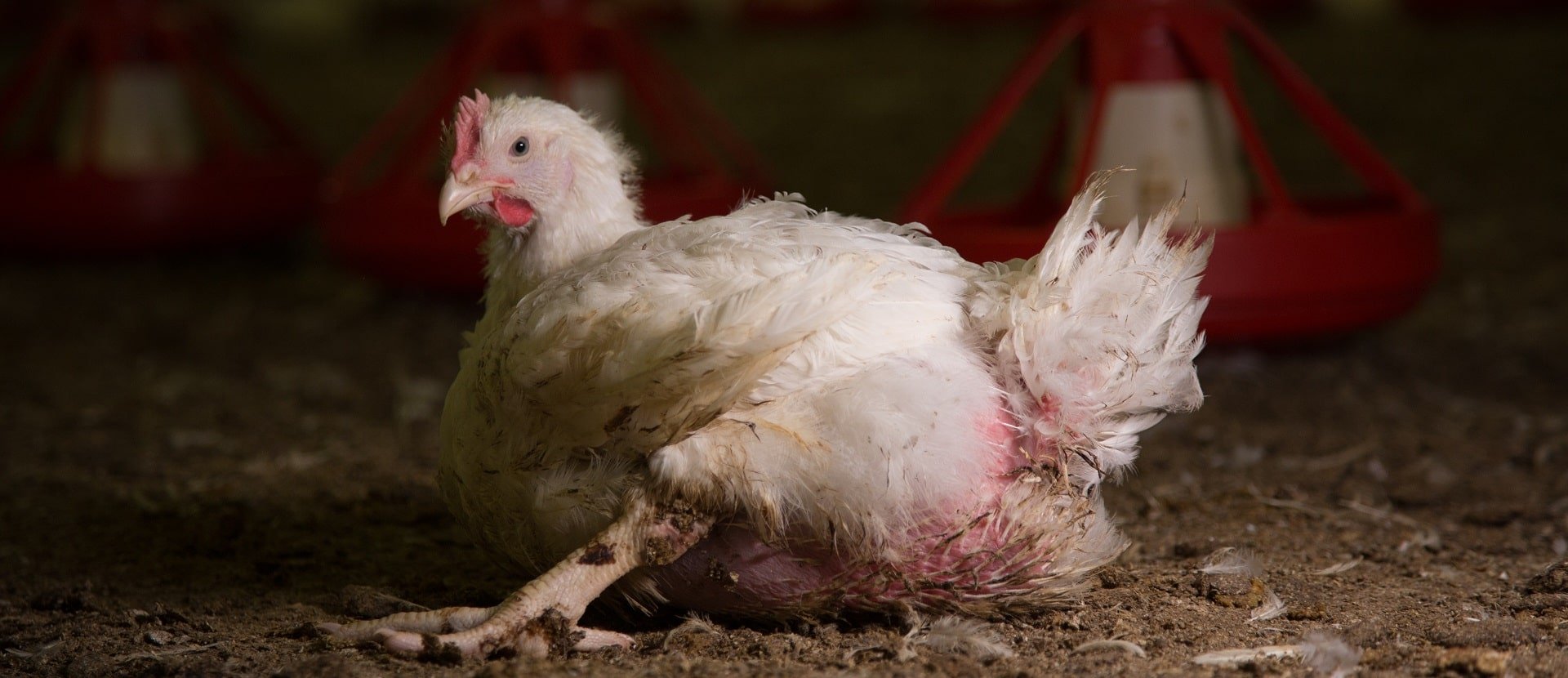
Chickens
Image credit: Header image: Farmwatch
Chickens are only rationed an area the size of an iPad
Chickens are intelligent beings who can tell people they know from strangers. They are also sensitive and have different personalities. But factory farm systems are not treating chickens as living beings with feelings but as cogs in a machine – inflicting pain and suffering at every stage of their short lives.
Approximately 40 billion chickens are reared for meat each year in intensive farming systems, often with no natural light or fresh air, unable to peck or spread their wings. They are bred to grow unnaturally large and at a rate that is unhealthy and unnatural.
Due to their overgrown size and unnatural speed of growth, these chickens often suffer from painful lameness, overworked hearts and lungs, and wounds like skin sores and burns.
But there is a better way. With you by our side, these birds can have a life worth living – more time to grow, more space to move, more natural lighting and more opportunities to behave like a chicken.
Call on KFC to give chickens better lives
Fast-food giant KFC is one of New Zealand’s most established restaurants with more than 100 stores.
Despite being famous for their chicken, KFC are lagging when it comes to chicken welfare. Chickens are suffering and it doesn’t have to be that way.
KFC New Zealand haven’t signed the Better Chicken Commitment. This means they continue to let chickens suffer in their supply chain. It’s time for that to change.
No animal deserves the life these chickens live. Together we can call on KFC to sign the Better Chicken Commitment and put a stop to the cruelty these creatures experience.
The ANZ Better Chicken Commitment
The ANZ Better Chicken Commitment (BCC) addresses some of the biggest causes of suffering on chicken farms. It is a leading set of science-based standards to improve the lives of chickens across the food industry in Australia and Aotearoa New Zealand.
These standards require supply chains to provide chickens with more room to move and express their natural behaviours, more natural light, air quality, the inclusion of enrichments such as perches and less suffering at slaughter.
Most importantly, the BCC bans the use of unnaturally fast-growing chicken breeds which are slaughtered within just five to six short weeks.
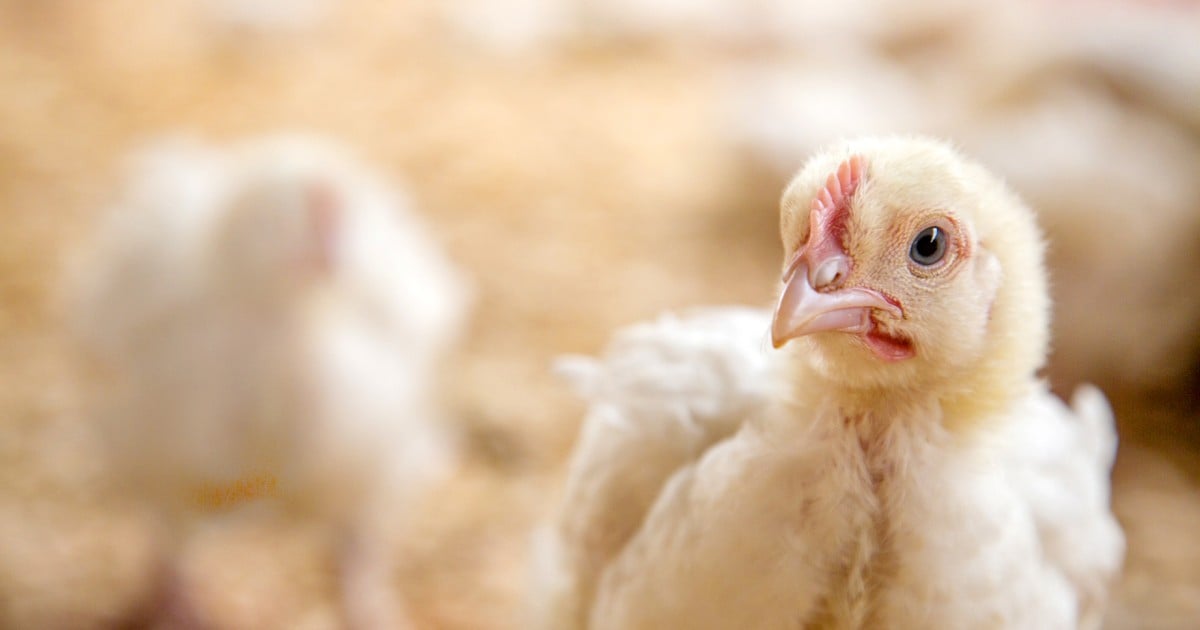
Broiler chickens who are farmed for their meat often live short, painful lives as their rapid growth causes them to suffer from various ailments including lameness and chronic heart and lung conditions. Chicks sometimes suffer organ failure just weeks after they hatch.
In order to ensure no chicken ever endures such a horrific fate, the New Zealand Society for the Prevention of Cruelty to Animals (SPCA), Animals Aotearoa and The Humane League with support from World Animal Protection and eight other global animal welfare organisations including Compassion in World Farming, developed an Australia and New Zealand version of the Better Chicken Commitment that is used in Europe and North America.
By making the commitment, food businesses and restaurant chains in Australia can give meat chickens in their supply chains better lives.
Domino’s was the first company in Australia and Aotearoa New Zealand that was moved to sign this commitment. Today, eight more have joined in to give their chickens lives worth living.
With your support, we will continue calling on more companies to commit to the humane treatment of chickens.
Give KFC chickens better lives
Call on KFC to sign the Better Chicken Commitment and put a stop to the cruelty these creatures experience.
Donate to protect chickens
In industrial farming, a chick may go her entire life without seeing sunlight. Together, we can give chickens lives worth living.
The Pecking Order
Read our 'Pecking Order' report and find out how global fast-food brands are responding to the chicken crisis.
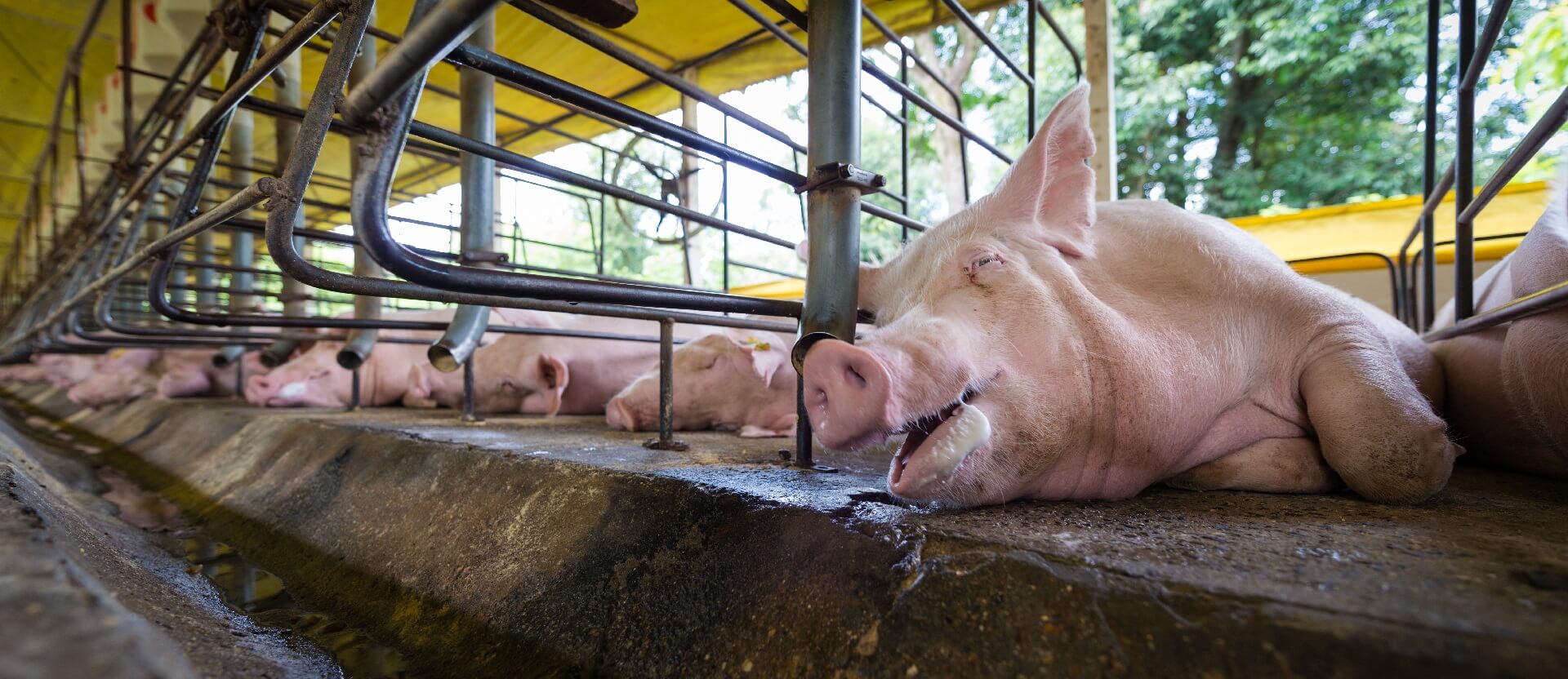
Pigs
Pigs live in horrifying conditions on factory farms
Pigs are intelligent, curious and empathetic animals. Given a choice, they would spend their days socialising with friends, rooting around for food and resting on comfortable bedding.
Unfortunately, pigs farmed for meat will never get to show off their intelligence or follow their instinctive curiosity because they are often confined to barren, small steel cages on factory farms. Mother pigs have it especially bad as they are inseminated in a cage no bigger than an average household refrigerator, with barely enough room to move. While most are then moved into group housing, about 20% of mother pigs in Australia are still confined to sow stalls for most of their pregnancy.
In the first week of a baby pig’s life, his or her teeth are clipped or ground, the tail is cut, and males can be castrated, often without pain relief. Pigs raised for meat are kept in barren pens with uncomfortable flooring, which cause them to suffer painful skin lesions and diseases.
For mother pigs, life inside a cage the size of a refrigerator is no life. With your help, we are pushing for pigs to have the opportunity to express natural behaviour and socialise, free from the confines of cages and free from painful mutilations. Together, we will call on the industry to make a change and give pigs a life worth living.
A Pig's Tale
Read our 'Pig's Tale' report and learn about how pigs suffer on factory farms.
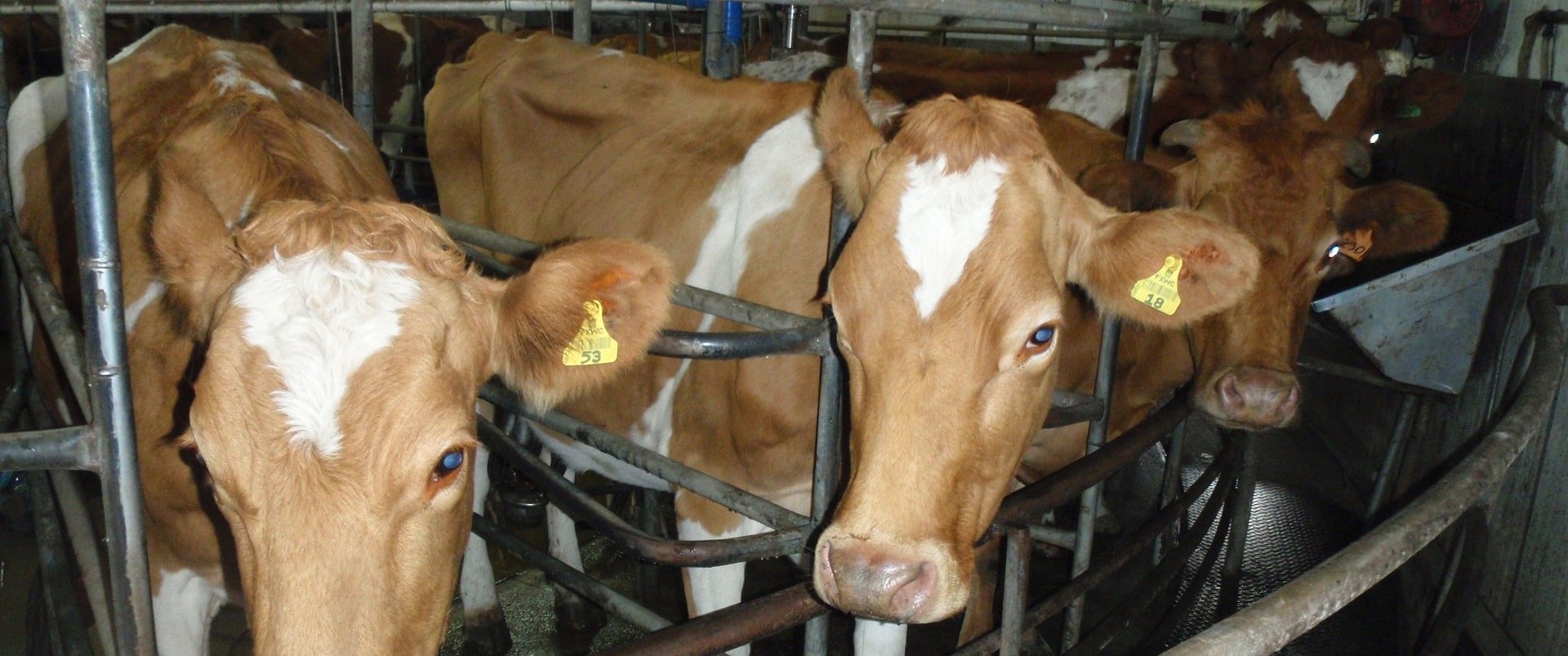
Dairy cows
Image credit: Christine Ellsay / Unsplash
Dairy cows: cruelly separated from calves and treated like milk machines
Cows are highly social and sensitive animals. They communicate with one another through more than 300 different sounds and are known to bond by licking each other. They feel happy staying in big groups, which is why they’re often found in herds.
However, these sentient beings are being exploited on intensive factory farms. They are made to live in miserable conditions to cater to the every-increasing demand for milk and dairy products. And their babies, for whom they produce the milk, are cruelly ripped from them soon after being born which is immensely traumatic for mother and baby.
Cows are typically restricted to hard-floor barns, also known as ‘feedpads’ where they are deprived of sunlight, grass and wide-open spaces. And instead of their natural grazing diet, they are fed high-energy grain-based feed. This is because farmers wish to stop the cows ‘wasting’ energy on walking and grazing.
The high demand for cattle has resulted in a rise in live exportation on ships, which is a cruel and stressful process for the animal. These gruelling journeys can last for up to 35 days. As a result, thousands of cows die in transit, and if they do survive, they face unnecessary rough handling and can be killed while still conscious.
With your support, we can ensure no cow ever faces such a cruel fate and give each cow a life worth living.
Cow facts
Did you know that to communicate with each other, cows have 333 unique sounds and bond by licking one another?
Donate to protect animals
Factory farming traps farmed animals in an endless cycle of abuse and cruelty. This tragedy will only worsen as demand for meat grows globally.
